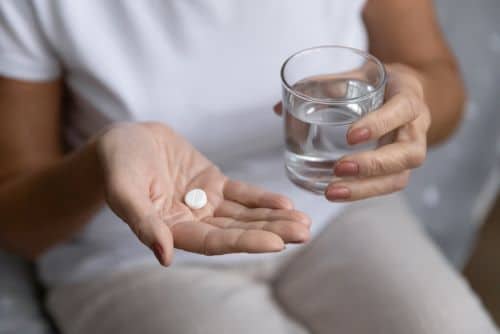At first glance, it makes sense to take a daily low-dose aspirin to prevent heart disease.
Aspirin thins the blood. This should reduce your risk of a blood clot that could lead to a stroke or heart attack.
But this benefit comes at a high price.
A study in the British Journal of Pharmacology found that daily aspirin reduces risk of a heart attack or stroke by 17%. But that is offset by a 34% higher risk of bleeding in the brain and a 47% higher risk of gastrointestinal bleeding.[i]
Daily aspirin is worth the risk only when you already have heart disease—not to prevent it, said the researchers.
Now, scientists have found another serious aspirin downside for seniors.
In a new clinical trial, researchers divided 19,000 people over age 70 into two groups. One group took a daily 100-mg aspirin. The other took a placebo.[ii]
After five years, far more subjects in the aspirin group had died of cancer.
Aspirin did not seem to cause more cancers, but it made malignancies deadlier. The study found that stage 3 cancer patients taking daily aspirin were twice as likely to die than those who didn’t. [iii]
Dr. Frank Sinicrope is a gastrointestinal cancer specialist. He said the research is alarming. “There is potential for more advanced cancers to develop in these older patients,” he said.
4 Natural Ways to Prevent Heart Disease
There are safer ways than aspirin to prevent heart disease. These natural solutions will help keep your arteries clear without added cancer risk or dangerous bleeding:
- Omega-3 fish oil. A study from Harvard University looked at heart health data from more than 120,000 subjects. Researchers concluded that people who took daily fish oil supplements cut their risk of heart attack and coronary artery disease by 8%.[iv]
That may not seem like much. But an 8% drop in heart disease would save nearly 50,000 American lives a year.[v]
It’s important to be careful when you buy fish oil supplements. Most are made with a cheap process that yields something called an ethyl ester (EE). This kind of fish oil is less bioavailable. Labels of EE fish oil often say the product is derived from “marine oil concentrate.”[vi]
Instead, look for brands that contain the triglyceride form of fish oil. It should be noted on the label. You’re more likely to find quality fish oil supplements at health food stores and online than at drug stores and supermarkets.
According to the European Food Safety Authority, omega-3 supplements can be safely consumed at doses up to 5,000 mg daily.[vii]
Check with your doctor before taking fish oil if you’re taking a blood-thinning medication. - Lingonberry juice. Lingonberries are native to Scandinavian countries where they are used to make jams, syrups, and sauces, in addition to juice.
An animal study at Finland’s University of Helsinki found that lingonberry juice lowers blood pressure three ways: It reduces inflammation in the aorta. It increases levels of nitric oxide, which relaxes arteries. And it beneficially affects something called the renin-angiotensin system. It’s the body’s main regulator of blood pressure. [viii]
Lingonberry juice is available from online retailers and health food stores. Look for brands with no sugar added. Drink 10 ounces a day to lower blood pressure. - Chili peppers. Researchers from Italy’s Mediterranean Neurological Institute tracked the health and eating habits of 22,811 people for eight years.[ix]
The scientists discovered that eating chili peppers four or more times a week lowered the risk of death from heart attack by 40%.
The study found that hot peppers improved heart health even when subjects ate an otherwise unhealthy diet.
Dr. Marialaura Bonaccio was the study’s first author. She said someone could follow the healthy Mediterranean diet and another person could eat junk food, but for all of them “chili pepper has a protective effect.”[x]
If you don’t have a taste for hot peppers, try cayenne pepper supplements. You can buy them in health food stores and online. They give you heart-healthy capsaicin without the mouth-burning heat. - Meditation. Research shows it works far better than stents or drugs to increase blood flow to the heart.
A study published in the Journal of Nuclear Cardiology looked at 56 heart disease patients. They divided them into four groups, each getting a different kind of treatment: usual mainstream care, cardiac rehabilitation, meditation, and meditation plus cardiac rehabilitation.[xi]
After 12 weeks, heart blood flow increased 12.8% in the meditation group. It increased 20.7% in the meditation-plus-cardiac-rehabilitation group.
The rehabilitation group, which did not meditate, had just a 5.8% improvement. The group that got the usual mainstream treatments without meditation had a 10.3% decrease in blood flow.[xii]
The researchers think meditation helps the heart by reducing levels of stress hormones and inflammation. You can learn mindfulness, an easy form of meditation, by going here.
A daily aspirin isn’t the only route to a healthy heart…and it’s certainly not the safest.
Editor’s Note: Research shows the standard mainstream medical treatments to prevent heart attacks—stents and statin drugs—don’t work. Learn what does work in our monthly journal, Independent Healing. It’s your best source for science-based health advice. Find out more HERE.
Related Articles
Chocolate Lowers Heart Disease Risk, Study Finds
These Spices Fight the Underlying Cause of Cancer, Heart Disease, and Alzheimer’s
Study Uncovers the Key to Preventing Cancer and Heart Disease
Like this Article? Forward this article here or Share on Facebook.
[i]https://bpspubs.onlinelibrary.wiley.com/doi/full/10.1111/bcp.14310
[ii]https://academic.oup.com/jnci/advance-article/doi/10.1093/jnci/djaa114/5889955?searchresult=1
[iii]https://www.institutefornaturalhealing.com/2020/06/if-youre-taking-daily-aspirin-you-need-to-read-this/
[iv]https://www.ahajournals.org/doi/10.1161/JAHA.119.013543
[v]https://www.cdc.gov/heartdisease/facts.htm
[vi]https://www.mygenefood.com/find-best-omega-3-fish-oil-supplements
[vii]https://www.healthline.com/nutrition/fish-oil-dosage
[viii]https://helda.helsinki.fi/handle/10138/307040?locale-attribute=en
[ix]https://www.sciencedirect.com/science/article/pii/S0735109719382063?via%3Dihub
[x]https://www.medicalnewstoday.com/articles/327324.php#2
[xi]https://link.springer.com/article/10.1007/s12350-019-01884-9
[xii]https://www.eurekalert.org/pub_releases/2019-12/muom-pss112619.php

